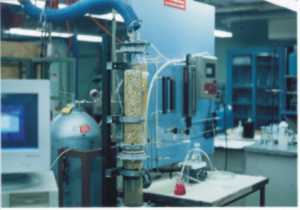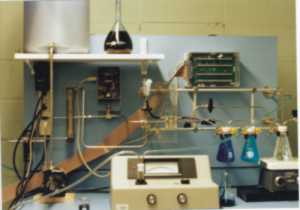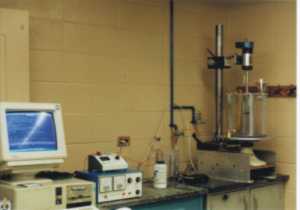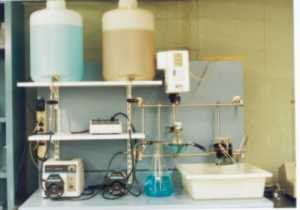Chemical Engineering E3810y:
Chemical Engineering and Applied Chemistry Laboratory
Overview
This course emphasizes active, experiment-based resolution
of open-ended problems involving use, design, and optimization of equipment,
products, or materials. Under faculty guidance students formulate, carry
out, validate, and refine experimental procedures, and present results in
oral and written form. The course develops analytical, communications, and
cooperative problem-solving skills in the context of problems that span
from traditional, large scale separations and processing operations to molecular
level design of materials or products. Projects include: scale up of apparatus,
process control, chemical separations, and molecular sensing. Safety awareness
is integrated throughout the course.
Projects are assigned to groups by dates (Class Schedule).
Click here to view group assignments. Links to project
descriptions are given at the end of this page (Instructional
Materials). The course syllabus and general information follow. Students
should read this information carefully - it is their responsibility to make
sure they are familiar with it and for acting accordingly. They should also
regularly examine this website for updated or new material.

Objectives
-
Develop skills in formulating experimentally based
solutions to achieve specified objectives.
-
Enhance ability to creatively synthesize classroom
knowledge for solving open-ended problems.
-
Teach critical analysis and evaluation of data
– including iterative optimization of experimental design that integrates
preliminary results.
-
Improve written and oral communication skills.
-
Teach cooperative and teamwork based approaches
to problem resolution.
-
Validate engineering concepts and principles from
prior coursework.
-
Familiarize students with assembly and use of laboratory
apparatus.
-
Educate students in safe laboratory practices.
These objectives are related to those of the Accreditation Board for Engineering
and Technology (ABET) in this table.

Staff:

Meetings:
Groups M1, M2, M3 and M4: Mondays, 1:00 - 5:00 PM, 281 Engineering Terrace
Groups W1, W2, W3 and W4: Wednesdays, 1:00 - 5:00 PM, 281 Engineering Terrace

Course Organization:
Students will work in groups of three. Each group will complete a total of
4 full projects, with each project spanning three weeks. The schedule of projects
is posted below.
Full Projects:
During week one of each full project, the groups will discuss with
the instructors the project objectives and thoroughly become familiar with
the operation of equipment used for that project. After this discussion and
before attending week two of the laboratory, each group must design an experimental
procedure by which the project objectives are expected to be met. The experimental
design is to be done independently by each group, and is perhaps the most
crucial (and most challenging) part of each project. To be successful, each
group must bring their knowledge of chemical engineering principles to bear
on the problem posed by the project. Material from past classes as well as
new issues may need to be reviewed and considered. As the projects are open-ended,
there are multiple ways and degrees to which the project objectives can be
met - the group must decide on the particular path to follow.
At the beginning of laboratory on week two, the groups will outline
their experimental plan to the instructor associated with their project before
proceeding to carry out the measurements. The experimental plan will count
for 40% of the grade for that project. After completing the measurements,
each group will be responsible for analyzing their results and for preparing
a written and an oral report (see links below for details on both types of
reports). The written report must be handed in at the start of class on week
three, and will count for 30% of the project grade. NO LATE REPORTS WILL
BE ACCEPTED WITHOUT PRIOR AUTHORIZATION BY THE INSTRUCTOR FOR THAT PROJECT.
All written reports are to be handed in to the teaching assistant. The oral
reports will be presented by all groups during class meeting on week three,
and will also count for 30% of the project grade.
Project Summary
|
Full Name
|
Abbrev.
|
Faculty Supervisor
|
Assistant
|
|
Packed Bed Mass Transfer and Flow Dynamics
|
PBD
|
Odian
|
Zheng
|
|
Dye-mixing Process Control
|
DYE
|
Barton
|
Zheng
|
|
Similitude and Power Consumption in Liquid Mixing
|
AGT
|
Barton
|
Wu
|
|
Liquid-liquid Extraction of Copper
|
COP
|
Odian
|
Wu
|
Class Schedule
|
Week of:
|
Group M1&W1
|
Group M2&W2
|
Group W3
|
|
Feb. 4 & 6
Feb. 11&13
Feb. 18&20
|
AGT
|
iCOP
|
iDYE
|
|
Feb. 25&27
Mar. 4 & 6
Mar. 11&13
|
COP
|
iDYE
|
PBDi
|
|
Mar. 25&27
Apr. 1 & 3
Apr. 8 &10
|
DYE
|
PBD
|
AGT
|
|
Apr. 15&17
Apr. 22&24
Apr. 29&31
|
PBD
|
AGT
|
COP
|
|
May. 6 & 8
|
Exam
|
Exam
|
Exam
|

Grading:
|
Each Full Project:
|
30 % if primary author, 10 % otherwise
|
|
Total for four projects:
|
60 % (= 30 % + 10 % + 10 % + 10 %)
|
|
Final Exam:
|
30 %
|
|
Attendance:
|
10 %
|
Each full project grade will be evaluated based on experimental design (40
%), written report (30 %), and oral report (30 %).
Important information regarding grading:
- Each group member must be a primary author on a
full project once. For reports with a primary author, the project counts
30 % toward that author's final grade and 10 % toward the final grade of
the other group members. If a report does not have a primary author, the
project will count 10 % toward the final grade of each group member. Groups
must individually decide which reports will have a primary author, and who
the author will be. For additional details on the responsibilities of the
primary author please see the links for "Written Report Guidelines" and
"Oral Report Guidelines" below.
The written reports must be personally handed-in to the teaching assistant
for the project at the beginning of class on week three of the project.
Late Reports: In general, late reports will not be accepted. In
outstanding situations, a report may be handed in late if prior permission
has been obtained from the instructor for that project. Such extensions
will be granted only in truly rare circumstances, and the decision to
provide an extension is at the instructor's discretion. It is the entire
group's responsibility to ensure that the written and oral reports are
finished on time. Please note that the staff is unable to differentiate
among members of a group with respect to late reports.
An unexcused absence from class will result in that student's "attendance"
to be decreased by 1 %.
The final exam is completed and graded on an individual basis, not as
a group. The exam will consist of multiple choice, fill in the blank,
and short answer questions drawn from the material on which the projects
were based. Please note that, in contrast to other laboratory courses,
a substantial part of each student's grade is dependent on the final examination.
The exam will be given in class on May 1st.

Definition of Primary
Author:
The primary author is the leader on the project. He/she is viewed by the
instructors as being given the responsibility of ensuring that the project
is appropriately designed, executed, and reported. It may be that he/she designates
what parts of the project are to be completed by which group personnel. It
is not expected that the primary author single-handedly complete a project;
on the contrary, all group members (including the primary author) are expected
to put forth similar efforts on each and every project. However, the primary
author is responsible for reviewing the project at each stage to ensure it
is being properly completed. In other words, the primary author has an administrative
responsibility for the project's success. Also, the primary author will give
the majority of the oral presentation for the project (see Oral
Report Guidelines).
That said, the role of the primary author as regards project design and the
written report is left to each group to implement as they best see fit. However,
it should be recalled that each group member must be the primary author once.
A well-organized, collaborative, fairly-distributed effort should prove to
everyone's advantage.

Laboratory Notebook:
Each group needs to keep a laboratory notebook in which only material (such
as data, sketches, descriptions) relevant to this course is kept. A simple
"marble cover" composition book will suffice. There is no requirement for
numbered or duplicate pages, but no pages are to be removed. Incorrect material
is to be crossed out neatly.

Safety:
We want all students to be safe. We want no electrical shocks, no chemical
burns, no falls on wet floors, no injuries from rotating machinery, no infections
from unattended cuts, no burns from hot surfaces or materials, no hazards
from fire or smoke inhalation. Even mild joking around will be regarded as
a serious infraction if it poses a safety concern.
There are three main safety rules
-
Each student must have eye protection in
place, that is, actually protecting their eyes, at all times. A student
will be asked to leave the laboratory if they do not have eye protection.
One pair of safety goggles will be provided for everyone. Thereafter, each
student is responsible for bringing their safety goggles whenever working
in the lab. Please note that the instructors will not keep any extra safety
goggles to be lent.
- No food or drink is allowed in the laboratory area.
- Shorts and/or sandals are not to be worn in the laboratory area.
The chemical industry enforces stringent safety rules for social, humane
and economic reasons. It is important to acquire the habit of conforming to
prescribed safe practices.

Instructional Materials:
Instructions for the various projects and for report preparation are provided
on the linked pages below. Students can download and print these instructions
as needed.
Projects:
Report Preparation:
Written Report Guidelines
Oral Report Guidelines
s
![]()



